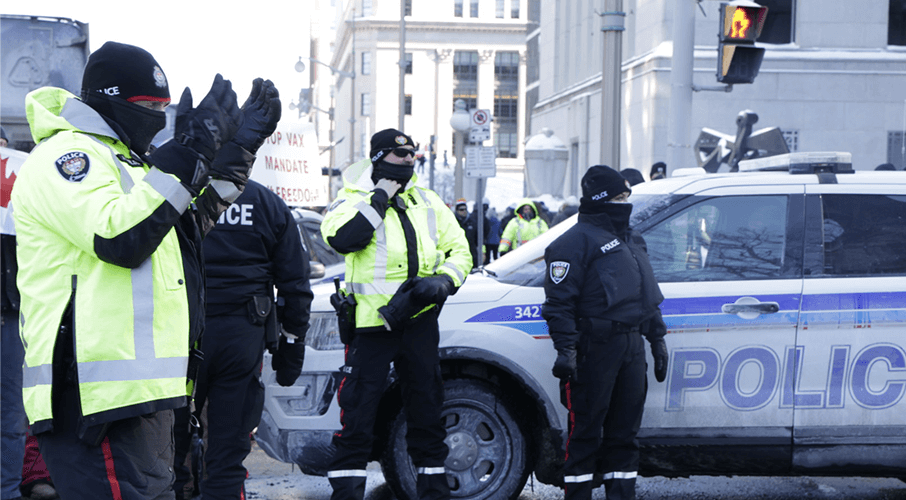This article originally appeared in the National Post.
By Aaron Wudrick and Ryan Alford, February 5, 2024
For victims of overly aggressive protests in the wake of the Israel-Hamas war, the Freedom Convoy in Ottawa two years ago gave valuable lessons on how to seek protection while ensuring lawful freedom of expression.
Since Oct. 7, demonstrations concerning the Middle East have taken place across Canada, once again igniting debate on the delicate balance between rights and public safety. Many protests have included symbols, actions and language that can arguably be classified as hateful, including harassment and intimidation against an identifiable group.
The challenge is, how can we protect the rights of those exercising free expression while ensuring swift action is taken against unlawful acts that threaten the safety of others?
The inclination when any group feels unsafe is to call for police or political intervention. Individuals who act outside the bounds of protected free expression — including violence, uttering threats and criminal harassment — should be arrested.
But when it comes to more sweeping action, it is the courts, with their capacity to scrutinize evidence and navigate the complexities of competing rights, that offer the best hope for a principled answer.
These current scenes from Israel-Hamas protests echo past instances, such as the Freedom Convoy, where the pressure for a quick resolution was strong. The two also share some other characteristics: like the Freedom Convoy, the pro-Palestinian protests are large gatherings that, in some instances, are disruptive and, at times, involve breaches of law.
Determining right and wrong in protests requires difficult and subjective value judgments. But while there is a temptation to enlist politicians and law enforcement to weigh these varied and competing interests, the most appropriate forum is the judiciary, specifically through court injunctions.
The Ottawa convoy protests provide a tangible example of the effectiveness of court action. Local residents, fed up with honking trucks, sought an injunction to restore peace. The court, after a consideration of facts and an attempt to balance the competing rights at stake, imposed a prohibition on horn-honking while permitting the protests to otherwise continue.
This decision exemplified a judicious and constitutionalist approach, maximizing the right to protest while minimizing the disruption to residents.
Similar actions are now being taken by groups like B’nai Brith Canada, which is seeking an injunction regarding pro-Palestinian protests in Toronto’s Avenue Road area. In this case, protesters are deliberately targeting a neighbourhood with a substantial Jewish population. While the court has not yet ruled, the very act of seeking an injunction requires parties to put forward a comprehensive evidentiary record and to swear to tell the truth about their goals and intentions.
Judges can then make more decisions that take into account each situation and tailor a solution that properly balances rights — such as permitting protests to continue, but not in locations where they clearly constitute a deliberate attempt to intimidate Jewish Canadians.
Removing police and politicians from adjudicating in complex situations should be seen as a positive move. When injunctions are issued, law enforcement can more confidently enforce the law, backed as they are with a court’s explicit blessing. This ensures police are more likely to be seen as neutral actors rather than informally replicating the court’s rights-balancing exercise.
Similarly, the temptation for politicians to demand action based on pleasing any particular constituency is diminished.
The court process to obtain an injunction not only provides a clearer framework for resolving conflicts during protests but also upholds the principles of due process and analysis of evidence, ensuring a more balanced, defensible and fair outcome for everyone involved.
Both the Freedom Convoy and pro-Palestinian protests are examples of thorny exercises of freedom of expression, intermixed with unlawful acts. The rule of law requires that we still attempt to distinguish the lawful and unlawful elements of each protest from each other to maximize the former and sanction the latter. Politicians and police are poorly placed to discharge this task, meaning affected groups would be well advised to make robust use of court injunctions instead.
Aaron Wudrick is the director of the domestic policy program at the Macdonald-Laurier Institute.
Ryan Alford is a professor in the Bora Laskin Faculty of Law at Lakehead University and a senior fellow at the Macdonald-Laurier Institute.






